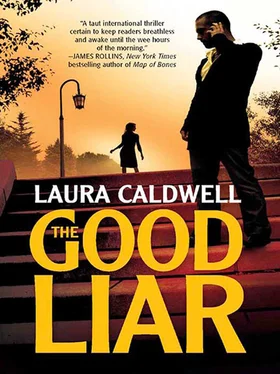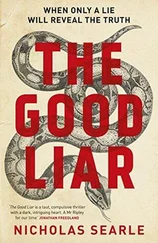He pulled a card out of his pocket. “Well, then, call me when you’re heading downstairs for a coffee sometime, okay? Or whenever. My cell phone number is on there, too.”
“Sure,” she said, taking it from him, liking the tiny race of her pulse.
Even though the number for her floor was already lit, she hit it again. “I’ll see you then.”
“Yeah, I’ll see you.” He gave her that grin again and stepped back.
Liza held Rich Macklin’s card as the elevator climbed. She liked the feel of it—light but with sharp edges. She stepped out when the elevator reached her floor. A large, glass block sign hung in the foyer with heavy, steel letters spelling out Presario Pharmaceuticals. Below that were two visitors’ chairs with an end table between them and a single black phone atop the table.
Liza lifted the phone, which was a STU-III, a secure telephone device designed to take audio signals, mix them digitally into a serial data stream and encrypt the voice. She rattled off a series of letters and numbers. “X68BTY233BR5Y780.”
A door in the side wall, barely perceptible, clicked twice. Liza pushed it open and entered a hallway with thick beige carpeting, the kind that might be seen in Rich Macklin’s law office downstairs. But the offices here weren’t filled with open doors and chatting lawyers. Every door was locked. No sound filtered into the hall.
Liza walked to her office door and held her thumb to the fingerprint pad. When prompted, she punched a different series of numbers and letters into the keypad. She stepped into her office. Its plain white walls surrounded a scruffy but beloved pine desk that had been handed down from her father. Her only adornments were an Oriental rug—plum and olive green—that she’d picked up in China, and two pictures frames, an oval one showing her and Kate at college graduation and one of her family taken in the mid-eighties. In it, her father stood behind Liza, Colby and her mom, his arms stretched out, trying to encircle them. She still thought of her dad that way—trying to hold all of them close, keep all of them safe. It was hard to believe she and her mom were the only ones left.
The phone on the desk made a single buzzing sound. Liza picked it up and held it to her ear without a word.
“Good morning, Liza,” said a female voice.
The voice belonged to a woman who was one of the analysts for the Trust. Her job was to monitor and interpret world events and to notify Trust operatives, like Liza, when those events might be of the slightest interest. But there was usually no “good morning” or “how are you doing” involved in these discussions. Why the formality? Liza wondered.
“Morning,” Liza replied cautiously.
“A small plane went down at the Moscow airport about half an hour ago.”
Liza furrowed her brow, still confused. “Was it carrying any cargo?” Moscow was one of the few Russian cities where Presario actually sold product.
“No.”
“Casualties?”
“Seven. The crew. Four passengers.”
“Anyone we know?”
There was a pause. An odd, surreal pause when the walls of her office seemed to close in one minute and then expand like a balloon the next. Liza swallowed hard. She closed her eyes and opened them.
“Aleksei Ivanov,” the woman answered.
Liza let her weight fall against the chair behind her. She felt as if a cannon had been shot at her insides. “Aleksei?”
Why was she having such a reaction? She hadn’t laid eyes on him in a few years. She sat immobilized then, unable to speak.
But Liza knew why—because Aleksei was different than anyone she had ever known or would ever allow herself to know.
She could imagine him as clearly as the first time they’d met in Rio. She could see those deep green eyes that went from shrewd to laughing in a split second, the perpetually mussed sand-colored hair, the thin, worn leather jacket. And those reporter’s notebooks he was always carrying around. He tried to get her to carry them, too. “For memory,” he said, tapping her gently on the forehead, his green eyes laughing then. She told him she didn’t need help with her memory. But now Aleksei was gone, and she wished she’d filled a notebook with the other details she remembered of him.
Liza struggled to take a breath. “Do we know why the plane went down?”
“No, but the other passengers were journalists, too.”
“Thanks for the call,” she managed to say.
“Of course.”
Liza hung up the phone and left her office just as quickly as she had entered it.
Five years earlier
Rio de Janeiro, Brazil
A s a warm blanket of darkness settled over the city, Liza Kingsley drew away from the spotting scope she’d been peering into. She took off the headphones. She stood and stretched, then allowed herself to slump onto the polished wood floor of the apartment. With her back against the outside wall, she stared at the place. Recently, this apartment had been owned by a wealthy Brazilian couple. It was in the Gávea neighborhood—a gentrified area in a city of favelas or shanty towns—but the couple hadn’t been wealthy enough to pass up the insane amount of money Liza offered them through a broker. The couple might have known that they lived directly across the street from João Pedro Franco, a business partner of Luiz Gustavo de Jardim. They would have undoubtedly followed Gustavo’s push for power and occasional threats to run for the presidency. They probably didn’t know that their apartment would be used solely to study and listen to Franco, Gustavo’s main confidant.
Gustavo, along with all of his close associates, was being watched. If ever reelected to the political realm, Gustavo would be in charge of many things other than the value of the real, the Brazilian currency, and the arms dealing he already controlled. Gustavo could eventually control the country’s vast oil resources and its production of fighter jets. It was not a power to be taken lightly. Gustavo was also known for being as corrupt as they come. When he’d been in office once before, it was widely suspected that he’d funneled significant funds meant for AIDS research to dummy companies in his control. Worse, they now had intel that he was taking meetings with different terrorist organizations and promising under-the-table sales of fighter jets, along with private aircraft. These terrorist organizations had been quietly searching for such jets for years, hoping to fill them with explosives and use them as flying bombs to attack the United States.
The Trust was attempting to determine whether such intel was correct, and if Gustavo meant to keep his promises once in office or if he was just shooting off his mouth. And so somewhere across the city, Gustavo’s house and office were under surveillance, while Liza watched his buddy, Franco (and his wife, kids, housekeeper and cook). In reality, Liza mostly listened to the conversations of all these people through the bugs they’d placed in Franco’s house. Like many of Rio’s nicest homes, Franco’s was built around an internal courtyard, invisible to the front, with only one window facing the street.
And so now across the street from Franco the newly purchased apartment had been bled dry of personal effects, and family memories and color, and it was filled with the cool blacks and silvers of surveillance equipment. Liza felt this apartment was somehow a metaphor of her own life, the way it was taken up with work and work only.
Before the light completely disappeared, Liza roused herself, packed away her scope and replaced it with an ATN night-vision scope. She returned the headphones to her ears. As she focused the scope across the street, watching for any visitors to Franco’s home, she saw a man approach the house, stop briefly to adjust his shoe, then move on down the street.
Читать дальше












